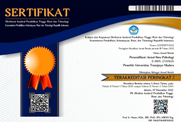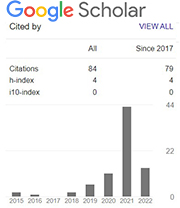Efektivitas Pelatihan Pemberdayaan Pengikut Loyalis yang Asertif di Lingkungan Pemerintah Provinsi Jawa Timur
Abstract
Keywords
Full Text:
PDF (Bahasa Indonesia)References
Amanollah, M., Kalkhoran, N., Naami, A., & Beshlideh, K. (2015). Iranian Psychological Association Followership Styles: The Difference of Employees in Their Job Motivation and Job Performance. IPA International Journal of Psychology, 9(1), 24–38. www.SID.ir
Amin, B., Hamidah, & Gunawan, K. (2020). The influence of transformational leadership, power distance, and followership on the decision making capability. Management Science Letters, 10(16), 3915–3922. https://doi.org/10.5267/j.msl.2020.7.019
Avolio, B. J., & Reichard, R. J. (2008). The Rise of Authentic Followership. In The Art of Followership: How Great Followers Create Great Leaders and Organizations (pp. 325–337). Jossey-Bass, Wiley.
Chaleff, I. (2009). The Courageous Follower: Standing up to & for Our Leaders (3rd ed., Vol. 4). Berrett-Koehler.
Crossman, B., & Crossman, J. (2011). Conceptualising followership - a review of the literature. Leadership, 7(4), 481–497. https://doi.org/10.1177/1742715011416891
de Zilwa, D. (2014). A New Conceptual Framework for Authentic Followership. In L. M. Lapierre & M. K. Carsten (Eds.), Followership: What is it and why do people follow? (pp. 47–72). Emerald Group Publishing Limited. https://subzero.lib.uoguelph.ca/login?URL=?url=https://www.proquest.com/docview/2130855164?accountid=11233%0Ahttps://ocul-gue.primo.exlibrisgroup.com/openurl/01OCUL_GUE/01OCUL_GUE:GUELPH? &genre=book&issn=&title=Followership&volume=&issue=&date=2014&atitl
de Zilwa, D., Deanna, de Z., de Zilwa, D., & Deanna, de Z. (2016). The strengths and capacities of Authentic Followership. Leadership and Organization Development Journal, 37(3), 310–324. https://doi.org/10.1108/LODJ-01-2014-0010
Embi, M. A. b., & Widyasari, R. (2013). Sistem pelayanan publik era otonomi daerah di kabupaten Kutai Kartanegara. Humanus, 12(2), 168–173.
Favara Jr, L. F. (2005). Putting Followership On The Map: Examining Followership Styles and Their Relationship With Job Satisfaction and Job Performance. Favara Journal of Business & Leadership: Research, Practice and Teaching, 5(2), 68–77.
Fontoura, P., & Coelho, A. (2020). The influence of supply chain leadership and followership on organizational performance: An empirical study on a Portuguese energy supplier. Baltic Journal of Management, 15(3), 333–353. https://doi.org/10.1108/BJM-01-2019-0012
Gardner, W. L., Avolio, B. J., Luthans, F., May, D. R., & Walumbwa, F. (2005). “Can you see the real me?” A self-based model of authentic leader and follower development. The Leadership Quarterly, 16(3), 343–372. https://doi.org/https://doi.org/10.1016/j.leaqua.2005.03.003
Hinojosa, A. S., Davis McCauley, K., Randolph-Seng, B., & Gardner, W. L. (2014). Leader and follower attachment styles: Implications for authentic leader-follower relationships. Leadership Quarterly, 25(3), 595–610. https://doi.org/10.1016/j.leaqua.2013.12.002
Jin, M., McDonald, B., & Park, J. (2016). Followership and job satisfaction in the public sector: The moderating role of perceived supervisor support and performance-oriented culture. International Journal of Public Sector Management, 29(3), 218–237. https://doi.org/10.1108/IJPSM-05-2015-0101
Kirkpatrick, D. L., & Kirkpatrick, J. D. (2006). EVALUATING TRAINING PROGRAMS (3rd ed.). Berrett-Koehler Publishers, Inc.
Kong, M., Xu, H., Zhou, A., & Yuan, Y. (2019). Implicit followership theory to employee creativity: The roles of leader–member exchange, self-efficacy and intrinsic motivation. Journal of Management & Organization, 25(1), 81–95. https://doi.org/DOI: 10.1017/jmo.2017.18
Lee, H.-J., & Reade, C. (2018). The role of Yin-Yang leadership and cosmopolitan followership in fostering employee commitment in China: A paradox perspective. Cross Cultural and Strategic Management, 25(2), 276–298. https://doi.org/10.1108/CCSM-12-2016-0216
Martin, R. (2015). A review of the literature of the followership since 2008: The importance of relationships and emotional intelligence. SAGE Open, 5(4). https://doi.org/10.1177/2158244015608421
Martua, J., & Rahmat, R. (2019). Peran Birokrasi Pemerintah sebagai Penyelenggara Pelayanan Publik. Citra Justicia, 20(1), 21–30. https://doi.org/10.31227/osf.io/5xvew
Nubatonis, O. E. (2021). Pelatihan Pembuatan Video Pembelajaran Dengan Aplikasi Bandicam dan Screencast O-Matic. In Jurnal Nasional Pengabdian Masyarakat (Vol. 2, Issue 1).
Rinanda, H. M. (2019). Sabet predikat WTP, Pemprov Jatim siap jadi wilayah bebas korupsi. Detiknews [on-Line]. https://news.detik.com/berita-jawa-timur/d-4730696/sabet-predikat-wtp-pemprov-jatim-siap-jadi-wilayah-bebas-korupsi
Rinanda, H. M. (2020). No TitleJawa timur raih prestasi kinerja tertinggi 9 kali berturut-turut. Detiknews [on-Line]. https://news.detik.com/berita-jawa-timur/d-5203732/jawa-timur-raih-prestasi-kinerja-tertinggi-9-kali-berturut-turut
Rustiono, D. (2020). Zona integritas menuju Wilayah Bebas dari Korupsi (WBK) dan Wilayah Birokrasi dan Bersih Melayani (WBBM) di KPKNL Pamekasan. Kementerian Keuangan [on-Line]. https://www.djkn.kemenkeu.go.id/kpknl-pamekasan/baca-artikel/12980/Zona-Integritas-menuju-Wilayah-Bebas-dari-Korupsi-WBK-dan-Wilayah-Birokrasi-dan-Bersih-Melayani-WBBM-di-KPKNL-Pamekasan.html
Supriyatno, H. (2020). Pemprov jatim usulkan 16 unit kerja peroleh predikat WBK – WBBM. Bhirawa [on-Line]. https://www.harianbhirawa.co.id/pemprov-jatim-usulkan-16-unit-kerja-peroleh-predikat-wbk-wbbm/
Ulum, M. (2019). Enam unit layanan provinsi jatim raih predikat bebas korupsi. Bisnis.Com [on-Line]. https://surabaya.bisnis.com/read/20191210/531/1179996/enam-unit-layanan-provinsi-jatim-raih-predikat-bebas-korupsi
Wang, L., & Liang, X. (2020). The influence of leaders’ positive and implicit followership theory of university scientific research teams on individual Creativity: The mediating effect of individual self-cognition and the moderating effect of proactive personality. Sustainability (Switzerland), 12(6). https://doi.org/10.3390/su12062507
Widjiastuti, A. (2015). Birokrasi Pemerintah Negara Sebagai Pemegang Peran Yang Sangat Strategis Dan Vital Dalam Menjalankan Penyelenggaraan Pemerintahan Negara. Jurnal Gema Aktualita, 4(1), 1–6.
DOI: https://doi.org/10.21107/personifikasi.v13i1.13942
Refbacks
- There are currently no refbacks.
Copyright (c) 2022 triyo utomo

This work is licensed under a Creative Commons Attribution 4.0 International License.


Personifikasi by Universitas Trunojoyo Madura is licensed under a Creative Commons Attribution 4.0 International License.










